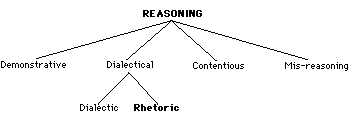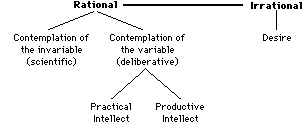Aristotle -- The Concepts of Syllogism and Enthymeme
I. Why does Aristotle conceptualize rhetoric by linking it to "dialectic"?
A. How does Aristotle understand the relationship between rhetoric and dialectic? What does he mean when he characterizes rhetoric as the "counterpart" of dialectic?
1. Both dialectic and rhetoric deal with general matters (koina tropon) rather than the matters of special sciences (epistêmês aphôrismenês).
2. Both rhetoric and dialectic are grounded in "dialectical reasoning." In his Topica, Aristotle identifies "dialectical reasoning" as one of the four ways in which the mind is able to reason:

B. OK; so both rhetoric and dialectic are grounded in "dialectical reasoning." But what does Aristotle mean by "dialectical reasoning"?
1. What does Aristotle mean by "reasoning"? In his Ethica Nicomachea (Nicomachian Ethics) he sketches a theory of the human mind (psychê) based on a fundmental distinction between rationality and irrationality:

1. Enthymeme in Clinton's initial statement on the Oklahoma City bombing:
- MP: <Attacks on innocent children and defenseless citizens are acts of cowardice and are evil.>
- mp: "The bombing in Oklahoma City was a n attack on innocent children and defenseless
- citizens."
- : The bombing was an act of cowardice and was evil.
2. Here is a passage from Clinton's address to the Iowa State legislature, which we read earlier this semester:
So while I would defend to the death anyone's right to the broadest freedom of speech, I think we should all remember that words have consequences. And freedom should be exercised with responsibility. And when we think that others are exercising their freedom in an irresponsible way, it is our job to stand up and say that is wrong. We disagree. This is not a matter of partisan politics. It is not a matter of political philosophy. If we see the freedom of expression and speech abused in this country, whether it comes from the right or the left, from the media or from people just speaking on their own, we should stand up and say no, we don't believe in preaching violence; we don't believe in preaching hatred; we don't believe in preaching discord. Words have consequences.
As you'll remember, a number of people criticized Clinton for these and similar remarks because they thought he was trying to associate his political critics (e.g., Liddy, Limbaugh) with the bombing. See if you can reconstruct the enthymeme that led these people to this conclusion.
- MP: Preaching violence is an abuse of the freedom to speak.
- mp: <Conservative talk-show hosts preach violence.>
- : Conservative talk-show hosts abuse the freedom to speak.
-
- MP: "Words have consequences" -> Preaching violence, hatred, and discord results in violent actions, like the OKC bombing.
- mp: <Conservative talk-show hosts preach violence, hatred, and discord.>
- : <Conservative talk-show hosts bear some responsibility for the OKC bombing.>
3. Reconstruct the "proof" in Debra Combs's H-RHETOR message on Clinton's use of "good rhetoric." Is Combs's proof a dialectical syllogism or a rhetorical enthymeme?
- MP:
- mp:
- : Clinton has been doing a "wonderful job."
-
- MP: Although one should usually distrust good/evil binaries, some situations justify their use.
- mp: <The OKC bombing is a situation that justifies the use of the good/evil binary.>
- : Clinton was justified in using the good/evil binary in his statements on the OKC bombing.
4. Reconstruct the "proof" in Wilkes's H-RHETOR message on Clinton's use of "bad rhetoric."
- MP: It is not good rhetoric to politicize national catastrophes.
- mp: Clinton politicized the OKC bombing by associating his political critics with the bombing.
- : Clinton's statements do not count as good rhetoric.

